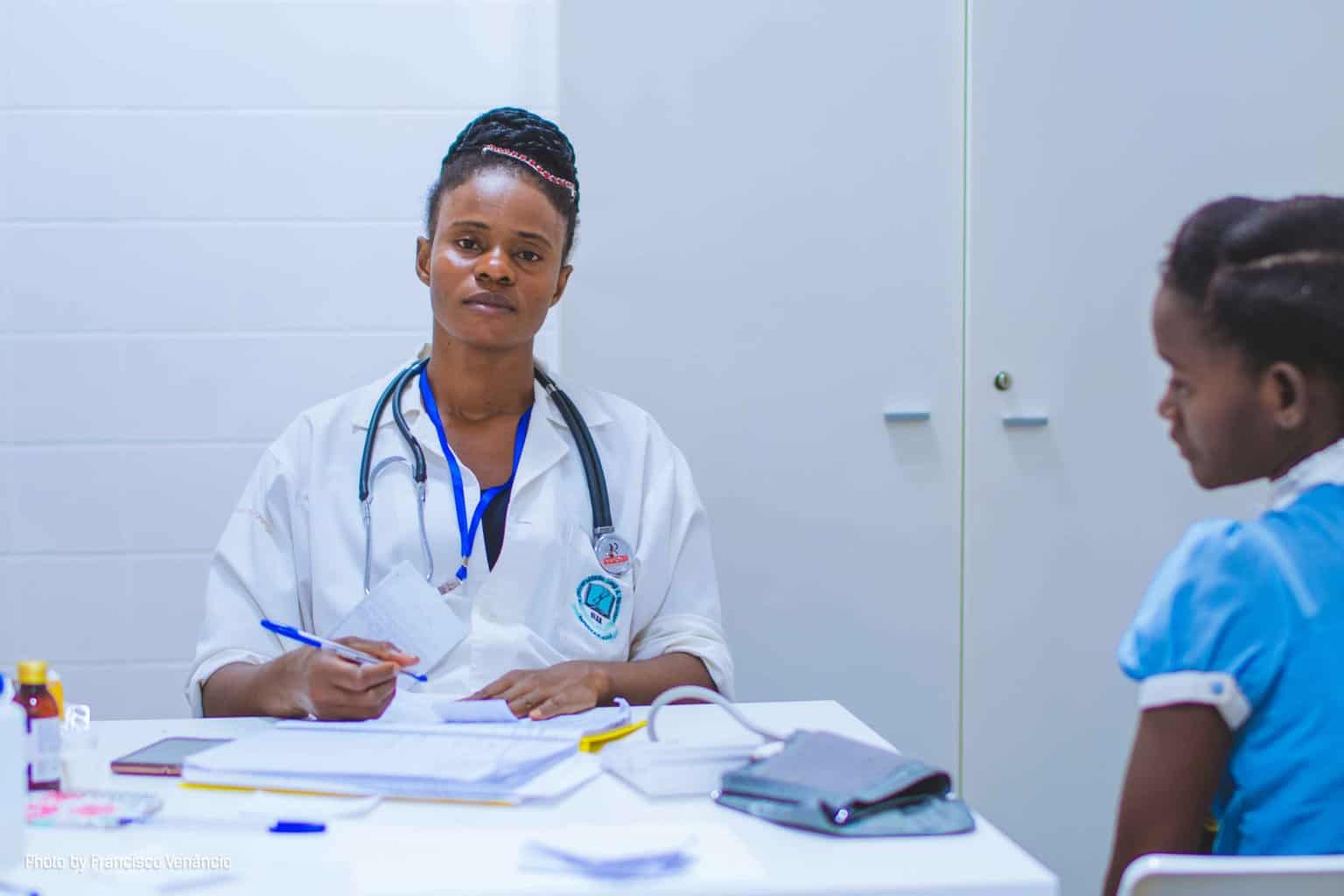Covid-19 and human rights in Angola
The people of Angola have suffered more than many in the Covid-19 pandemic, both because of the illness, and because of how the government has responded to it.
The appearance of the novel coronavirus has challenged governments worldwide, and caused suffering and hardship to millions. But that hardship has not been evenly distributed.
Children without internet access have missed out on education. Protestors and dissidents have suffered in custody. Throughout Angola and the world, human rights breaches due to Covid-19 worsened existing inequalities.
The Human Rights Measurement Initiative (HRMI) has conducted research into the effect of the pandemic on human rights in Angola.
HRMI’s research on the effect of Covid-19 on human rights
The Human Rights Measurement Initiative (HRMI), an independent, non-profit research collective, is devoted to documenting and measuring how governments treat people.
As governments have faced the pressing challenge of responding to the Covid-19 pandemic, HRMI has sought to measure the impact of their responses on human rights.
In our research on how government responses to Covid-19 have affected human rights, we have observed stark differences in the actions of governments, and therefore the experiences of people. Government responses to the pandemic affected a broad range of rights, from access to food and education, to freedom from arbitrary arrest, to voting rights.
We have measured the impact on 13 human rights, and present the finding in a report you can download here.
Human rights in Angola before the pandemic
According to HRMI’s annual human rights scores, the Angolan government has struggled to keep its human rights promises over many years.
On average over the last decade, Angola has achieved less than half of what it should be capable of, given its national income, when it comes to the rights to education, food, health, housing, and work/adequate income.
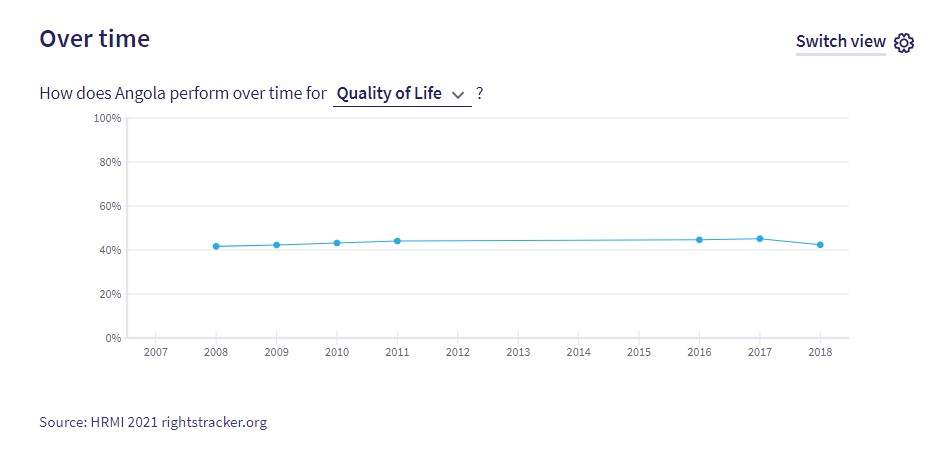
When we look at HRMI’s scores for Angola for civil and political rights, we see that there was a drop in many scores between 2019 and 2020, as the pandemic hit, but that the scores were generally at a concerningly low level even before that drop.
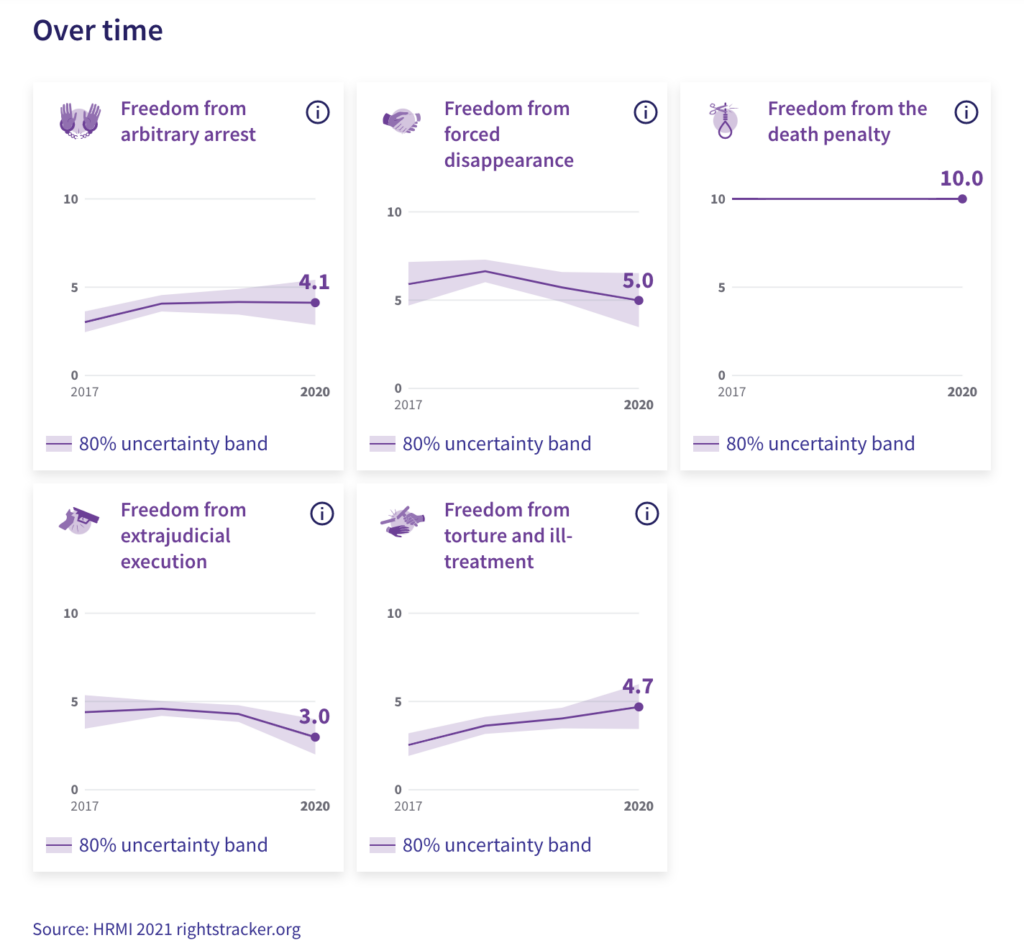
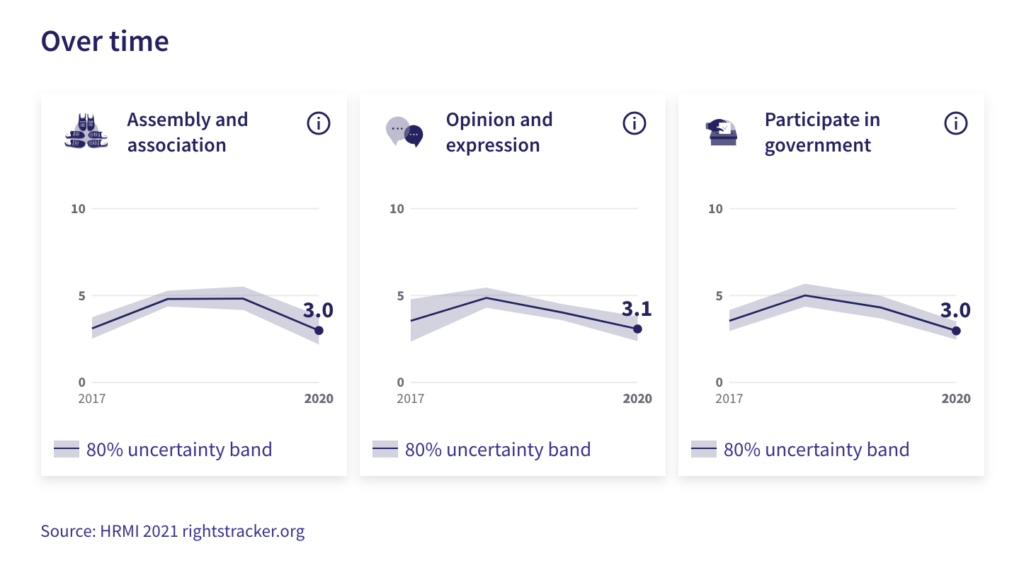
Government responses to Covid-19 cause rights violations
In our human rights survey in February and March 2021, we asked human rights experts about the effect Covid-19 had on human rights in 2020.
Human rights experts in Angola were emphatic in saying that the pandemic – and the government’s response to it – had worsened the human rights situation in Angola considerably.
Our full report on the impact of Covid-19 can be found here.
When asked what effect the Covid-19 pandemic in Angola had on the following categories of human rights, respondents gave these answers, on average:
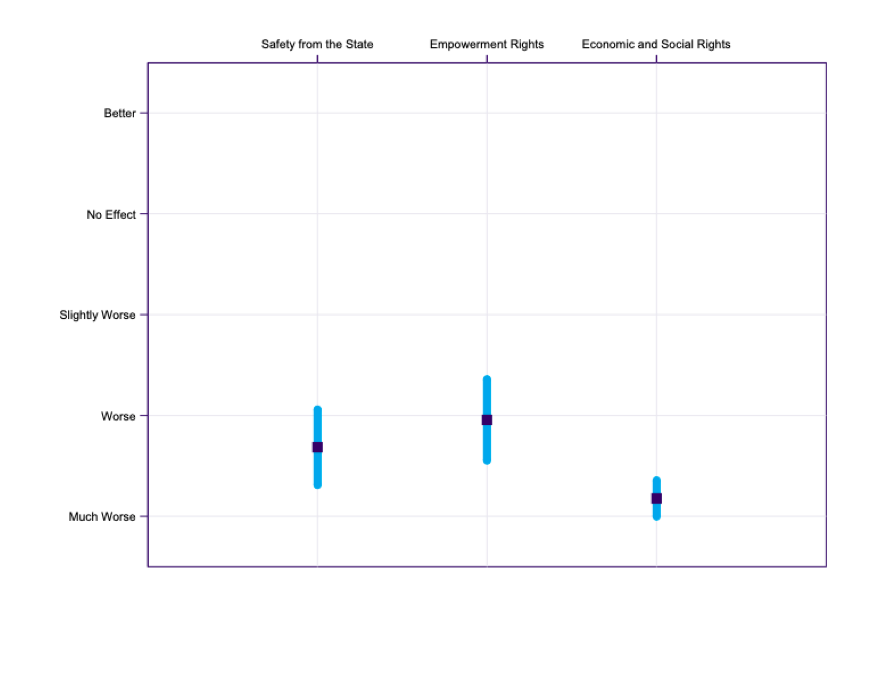
People were then asked which of the 13 human rights we measure were affected by the pandemic. Here are the results for Angola, in three graphs, grouping the rights into our three categories:
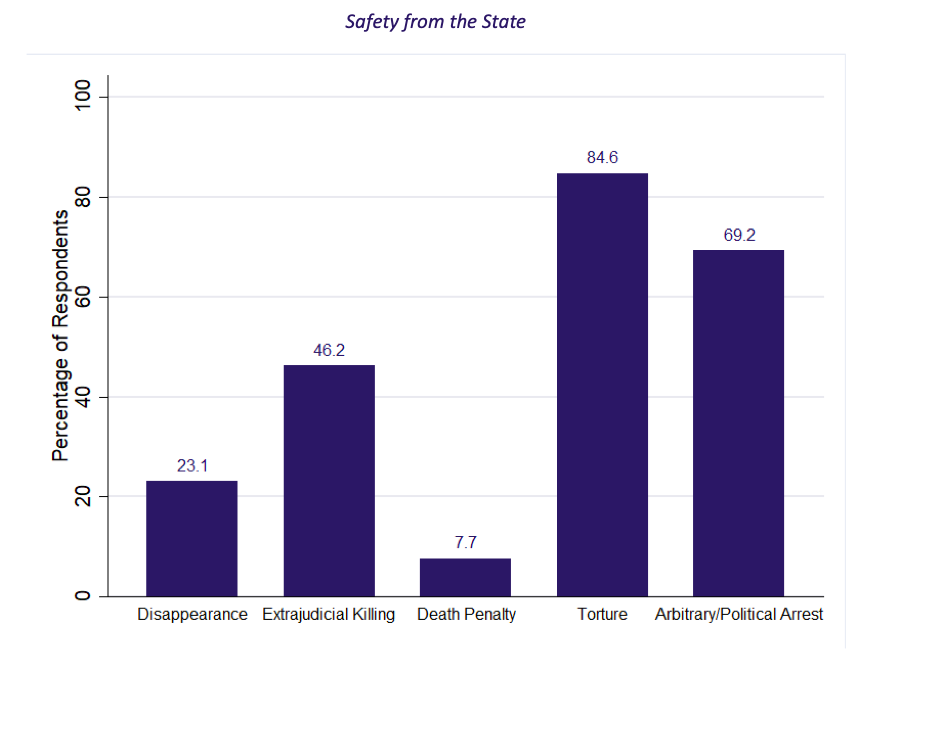
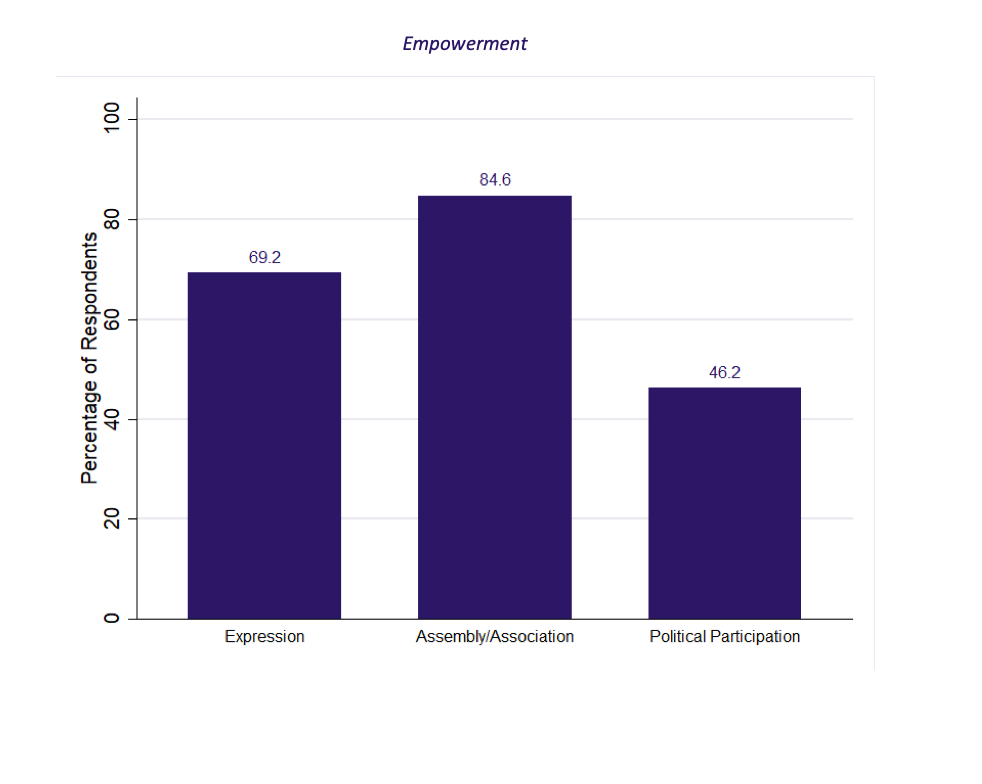
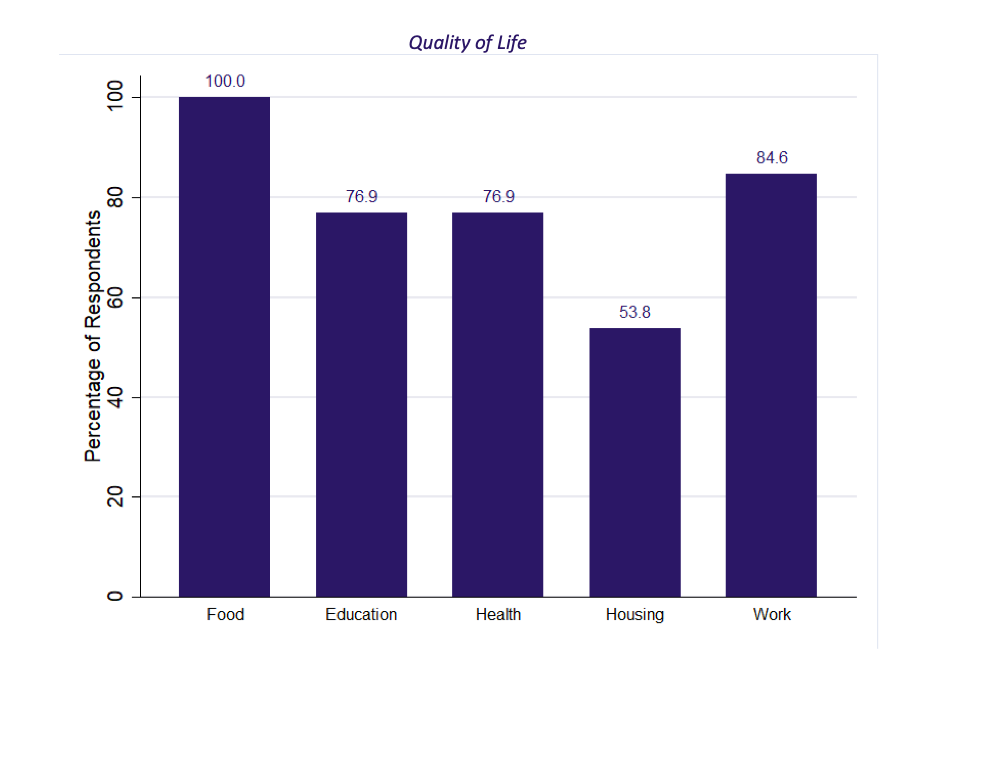
Every right we measure was badly affected by the pandemic. The worst affected were the right to food, and other economic and social rights; the right to freedom from torture and ill-treatment; and the right to freedom of assembly and association.
Human rights experts in Angola made extensive comments about who was at risk of rights violations because of the pandemic, including the following reports. These are all available on the Rights Tracker, under each ‘people at risk’ word cloud. They include the following:
Right to education
- Prisoners
- Activists
- People who lacked the necessary digital infrastructure to support distance learning due to Covid-19
- People who could not afford distance learning
- People who live in specific regions, specifically rural and periphery regions
- People who live nomadic lifestyles particularly in the cattle industry
- People who live at the lower end of the socio-economic stratum as there is not equal access to the same quality of education
- Children who have disabilities are not afforded the same quality of education, particularly those with hearing or visual impairments as schools do not make accommodations for them or have the technology needed to cater for them at school
Right to health
- Dissidents or activists who are members of opposition political parties
- People who suffer due to the unequal distribution of resources in the country
- People who are victims of medical malpractice due to doctor error
- Women, particularly those who are at risk of being raped during pregnancy
- Women with disabilities who risk having their uterus removed without their consent
- Prisoners
- People who are living with diseases that require special medical treatment or medicines
- People who have malaria
- People who live in peripheral areas
Right to freedom from arbitrary arrest
- Protestors, including those who protest peacefully for their rights and those who publicly express their criticism
- People who violated Covid-19 orders as a result of experiencing homelessness or hunger
- Young people who participated in demonstrations
- Dissidents and activists, especially people who are members of the opposition political party, denounced journalists, or young activists may be vulnerable to torture in detention
- People who are ex-managers of private and public companies without police connections
- People who counter police corruption
- People who seek to expose the current economic situation in the country
- Some officers face arbitrary arrest, including house arrest
- People from particular regions, especially individuals from the Cabinda, Lunda Norte, and Lunda Sul provinces
- People who defended the Luanda Human Rights demonstrations
- People who are members of civil society organisations
- People on the fringe of society
Right to freedom from torture
- People who were subject to the stay-at-home order as a result of Covid-19 were more vulnerable to torture
- People who suffered as a result of police abuse of power in the name of containing Covid-19
- Young people who participated in demonstrations
- Dissidents or activists, especially those who are defenders of human rights or belong to opposition political parties
- Young activists who demonstrate on the street as well as demonstrators in general
- Street vendors
- People who live in specific regions, especially those who live near the canyons rich with diamonds, those near the Lunda Norte province, and Lunda Sol province
- People who are members of civil society organisations
- People on the fringe of society.
Themes from the data
These findings make it clear that all human rights are connected. Crackdowns on the right to protest can lead to breaches of the right to freedom from arbitrary or political arrest and detention. Prisoners are then less likely to enjoy their rights to education and healthcare.
Throughout Angola and the world, human rights breaches due to Covid-19 worsened existing inequalities.
What can you do?
Leaders and governments are motivated by numbers.
The data in this report, and on HRMI’s Rights Tracker, make it clear that there are many alternative paths through the pandemic. Governments can choose to protect people’s human rights as they respond to Covid-19, making way for a more resilient and thriving population.
HRMI is not an advocacy organisation. We are producing these data to be used by others: people like you. Please, show your leaders these numbers, and tell them what changes you want them to make.
You can download the main report, and also an Appendix which contains specific graphs for each of the 39 countries.
Human Rights During the Pandemic
Appendix to Human Rights During the Pandemic
Thanks for your interest in HRMI’s data. To explore our human rights scores, please visit our Rights Tracker, where you can find data by country, right, or people group.


